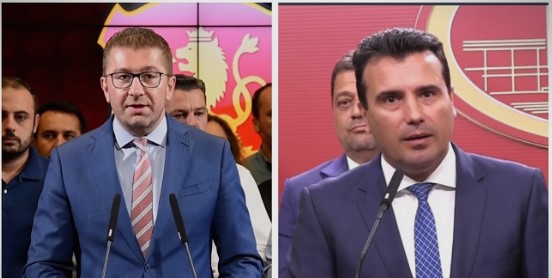Regarding the name issue, during the televised debate between opposition leader Hristijan Mickoski and Prime Minister Zoran Zaev, Mickoski said that when VMRO-DPMNE re-asserts the majority in Macedonia, he will work to reverse the damage caused by the Prespa treaty.
For us, this treaty is absolutely a capitulation. With it, we deny our own national identity. We are absolutely not prepared to accept it in any case, the text of the treaty we have now. This is a crystal clear position which we have maintained – that the treaty harms our national interest and asks us to deny our centuries old identity, said Mickoski.
After repeated insistence from Zaev to say whether VMRO would cancel the treaty once given the opportunity, Mickoski said that the party does not intend to burn down and destroy, but that it would reverse the negative consequences of the treaty.
Countries have capitulated at times, but would then unite and turn into real powers. We will win the elections, and then we will show you, Mr. Zaev, how one should work for the benefit of Macedonia. Those that say that it is all over, they are wrong, said Mickoski.
Zaev, on the other hand, repeatedly used the name “North Macedonia” and absolutely refused at several direct requests to say whether there are Macedonians living in Greece. A large part of the name issue are the minority rights of Macedonians living in Greece, who have faced decades of assimilation and expulsion by the Greek Government.
The official language in Greece is the Greek language and they are our friends. You will not get me to go into a fight with Greece, Zaev responded when asked what language do the Macedonians in Greece speak, and what language is sung during the festival in the village of Ovcarane.
This refusal to even mention the minority issue comes after Foreign Minister Nikola Dimitrov, whose family originates from Aegean Macedonia or Northern Greece, at one point also tied himself in knots when asked about his own relatives and the other ethnic Macedonians in the region. According to the reading of the Prespa treaty adopted by the Zaev Government, even mentioning that Greece has ethnic minorities, let alone trying to identify them, is a violation of the treaty.
This segment of the interview came just after Zaev passionately insisted that Greece, with the Prespa treaty, has accepted the existance of the Macedonian nation and the Macedonian language, only to refuse to mention the words in the context of Macedonians abroad, especially in Greece.
Zaev also revealed that Greek Prime Minister Alexis Tsipras accepted his proposal to name Macedonia the “Republic of Ilinden Macedonia”, but that it was rejected by the Greek opposition. This proposal was used to extract a response from Macedonia that this, mostly positively received proposal, would be acceptable for domestic use, but once this name was withdrawn, Zaev was still stuck with his acceptance of a much more extensive renaming process – one used domestically as well as internationally – but under a far less acceptable name – the “Republic of North Macedonia”.
During the interview, Zaev insisted that he agreed to the domestic use of the new name precisely because Greece accepted the Macedonian national identity. Greek politicians, on the other hand, insist that they only agreed that the adjective Macedonian is used to describe the citizenship of the citizens of the “Republic of North Macedonia”, while the language is called Macedonian but with a lengthy caveat that it is a Slavic language.




Comments are closed for this post.